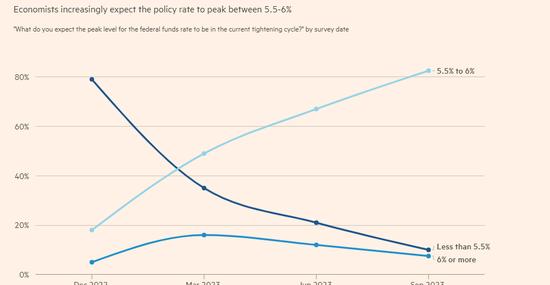Dreams to be shattered? The Fed may also raise rates, and more than once ...
According to the Financial Times survey, most well-known scholars and economists believe that the Fed will break investors' expectations and raise interest rates by at least another 25 basis points. More than 40 percent of respondents said they expect the Fed to raise rates twice or more at the current benchmark rate level of 5.25%-5.5%.
That's in stark contrast to sentiment in financial markets, where federal funds futures traders believe the Fed's policy setting is tight enough to keep inflation in check so it can keep interest rates unchanged until 2024.
The survey was conducted by the Financial Times in partnership with the Kent A Clark Center for Global Markets at the University of Chicago Booth School of Business. The survey shows that the borrowing costs required to completely root out price pressures and bring inflation back down to 2% will be higher than market participants currently expect.
Julie Smith, an economics professor at Lafayette College, said: "We have some signals that policy is not that tight". She noted that interest-rate-sensitive sectors, such as the housing market, remained "surprisingly strong" despite the earlier shock. "There doesn't seem to be enough resistance to stop consumers, and I think that's the real problem."
Of the 40 respondents surveyed between Sept. 13 and Sept. 15, about 90 percent believe the Fed has more work to do. Nearly half of the economists surveyed forecast a peak of 5.5%-5.75% in the Fed's funds rate, indicating another 25 basis point hike. Another 35% expect the Fed to raise rates twice more (25 basis points each), pushing the benchmark rate to 5.75% to 6%. A small group (8%) believe the policy rate will exceed 6%.

Once interest rates peak, the vast majority of economists surveyed believe the Fed will keep rates unchanged for quite some time. About 60 percent of respondents believe the first rate cut will be in the third quarter of next year or later. This is nearly double the number at the time of the last survey in June.
The survey comes days before Fed officials are about to hold their September policy meeting, where they are expected to pause action again. The rapid policy tightening since March 2022 is the Fed's biggest effort to reduce demand in decades. While inflationary pressures have weakened and labor markets have softened, many economists surveyed worry that the underlying momentum in the world's largest economy remains too strong and inflation will become more difficult to eradicate.
Gordon Hanson, a professor at Harvard's Kennedy School, said: "Just as people worry that the Fed will react too slowly, you don't want the Fed to ease too quickly."
Since June, respondents have doubled their projections for year-end economic growth, with a median estimate of 2 percent. The unemployment rate is expected to stabilize at 4 percent, while the Fed's preferred measure of inflation, the Personal Consumption Expenditures Price Index (PCE), excluding food and energy prices, is expected to slow to 3.8 percent. As of the latest data for July, the index stood at 4.2%.
At the end of 2024, only a third believe that core inflation is "very" or "somewhat" unlikely to exceed 3%. The vast majority believe that the probability of more than 3% is equal or greater. They say reduced oil supply is the biggest risk to the inflation outlook.
Following Saudi Arabia and Russia's decision to cut energy supplies, Christiane Baumeister, a professor at the University of Notre Dame, also expressed concern about energy prices. She expects prices to rise further if companies choose to pass on higher costs to consumers, potentially raising expectations for future inflation and delaying a pullback in core price growth.
However, headwinds in the United States, including student loan repayments and the threat of a government shutdown, could further weigh on demand.
Sebnem Kalemli-Özcan, an economist at the University of Maryland and a member of the New York Fed's Council of Economic Advisers, is one of the majority economists surveyed who believe that the so-called neutral rate (the level of interest rates that neither stimulates nor dampens economic growth) is temporarily higher than in the past. That would further delay the Fed's pace of cutting policy rates next year, she said. However, "even though we feel it's higher, we don't know how high the R-star [neutral rate] really is now."
Economists surveyed are more optimistic about the possibility of a soft landing, in which the Fed can reduce inflation without causing too much job loss. More than 40 percent of respondents believe that inflation is "more likely" to fall back to 2 percent if the unemployment rate does not exceed 5 percent. Another quarter said it was "unlikely." When asked about the timing of the next recession, many pushed back their estimates.